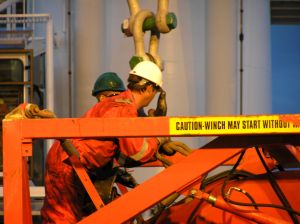 This is a case from the 11th Circuit that addresses The Jones Actwhich provides a cause of action in negligence for, “a seaman,” personally injured, “in the course of employment,” 46 U.S.C. § 30104. This case also addresses, at the trial court level, the theory of Comparative Negligence that was discussed in my blog post yesterday about Comparative Negligence under Georgia Law.
This is a case from the 11th Circuit that addresses The Jones Actwhich provides a cause of action in negligence for, “a seaman,” personally injured, “in the course of employment,” 46 U.S.C. § 30104. This case also addresses, at the trial court level, the theory of Comparative Negligence that was discussed in my blog post yesterday about Comparative Negligence under Georgia Law.
A Mr. William C. Skye brought an action against his employer, Maresk Line, claiming that his employer was liable to him for Skye’s condition of Left Ventricular Hypertrophy by negligently giving him excessive duties and duty time, and that he was overworked to the point of fatigue.
Ventricular Hypertrophy is a condition that causes thickening of the heart wall of the left ventricle, which Skype’s cardiologist attributed to hypertension and concluded that Skye’s, “continued physical stress related to his job, with long hours and lack of sleep,” caused conditions that ultimately led to his Left Ventricular Hypertrophy.
There was a trial by a Jury at the District Court level. Before the jury deliberated, the court instructed the jury that it must decide whether Skye’s injury and its causes were physical or emotional and stated in part that, “the law holds that a seaman such as the plaintiff cannot receive compensation for a purely emotional injury.” The Court further instructed the Jury that, “If you determine it is an emotional one, in order to recover, plaintiff has the burden of proving by a preponderance of the evidence that his injury was sustained as a result of his fear for his own physical safety or incurred while in a zone of immediate physical danger.”
The Jury at the District Court level found for Skye and rendered a verdict for over $ 2M, and the court reduced the verdict to over $ 500,000 for Skye’s Comparative Negligence. The Jury found Skye 75% negligent for his injuries.
As stated in my blog yesterday, had this been a case tried under Georgia Law’s theory of Comparative Neglignce, then the Plaintiff would not have been able to recover anything since, under Georgia Law, if it is found that the Plaintiff is 50% or more negligent that the Plaintiff is totally barred from recovery. This was a case tried under Federal Law, however, so the Plaintiff’s Comparative Negligence of 75% did not bar him from recovery.
The Employer appealed to the Court of Appeals, and the 11th Circuit reversed the judgement for the Plaintiff and ruled as a matter of law for the Defendant stating that the Plaintiff’s complaint of, “an injury caused by work-related stress is not cognizable under the Jones Act, which concerns injuries caused by physical perils, ” citing the decision in the Supreme Court case of Consolidated Rail Corp. v. Goths’ 512 U.S. 532, 114 S. Ct. 2396 (1994) as legal precedence.
The Court of Appeals stated that not all work-related injuries are cognizable under the Federal Employers’ Liability Act, and in this case, the Jones Act, since the Supreme Court has made it clear that these statutes are in place to insure the safety of a person from physical injuries caused by the negligence conduct of the employer, and not emotional injuries, and that injuries caused by work-related stress is not a “physical peril,” and that emotional injuries are only recoverable if the emotional injury is caused by the fear of physical injury when the worker is in the zone of physical injury, not when the worker is outside the zone of physical injury.
The Court of Appeals further stated that a work schedule is not a physical peril, and that compensating Skye for his injuries would potentially open the flood gates for trivial lawsuits since there is no way to predict what effect a stressful work environment would have on any given employee, unlike a physical accident, such as an explosion.
At Julie A. Rice, Attorney at Law, & Affiliates, we are experts in both State and Federal Workers’ Compensation Law so if you or a loved one has been injured or killed on the job, then Contact Us immediately for your free legal consultation so that you receive the just compensation that you deserve. We are here to assist you so that you recover from your on the job injuries.